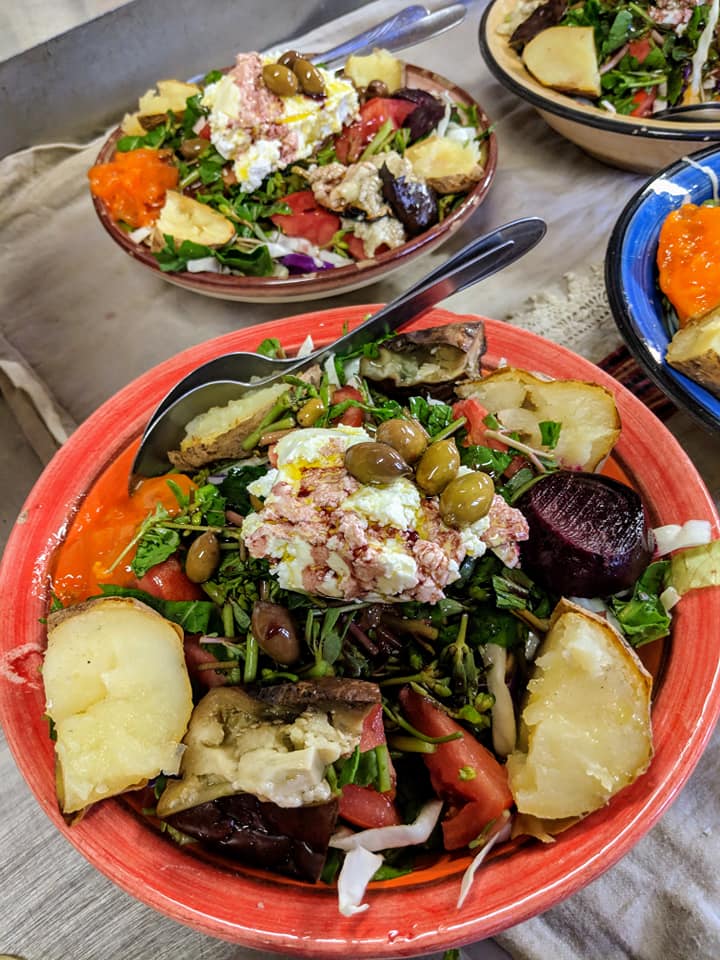From delicious avocado toast to olive oil roasted vegetables, it seems that the fat-phobia of previous decades has finally started to pass. Some have swung the pendulum a bit too far in the other direction, embracing rigorous ketogenic diets. A healthy Mediterranean Diet welcomes fats like olive oil, nuts, fish and avocados. However, unlike the ketogenic diet, the Mediterranean Diet does not restrict whole grains, legumes, fruits and vegetables (quite the opposite-they are plentiful in the Mediterranean Diet).
What exactly is a keto diet you ask? Restricting carbohydrate and sugar intake and replacing it with fats (e.g., avocados, walnuts, extra virgin olive oil, coconut oil, grass-fed butter) is the premise. Specifically, the keto diet seeks to force one’s body into using a different fuel. That is, instead of relying upon sugar (glucose) that comes from carbohydrates (such as grains, legumes, vegetables and fruits), the keto diet relies on ketone bodies, a type of fuel that the liver produces from stored fat. It is thought that the reduction of carbohydrates puts your body into a metabolic state known as ketosis, during which you burn fat rather than carbohydrates for energy.
While fat breakdown via ketosis can produce impressive weight loss, this “quick fix” can also come at a cost. Doctors warn that starving the brain of its primary energy source could potentially be harmful in the long-term, for patients who do not need a keto diet for medical reasons (like seizures).
A healthier, more balanced alternative can be found in a traditional Mediterranean Diet. Historically, traditional Mediterranean diets have contained moderate amounts of fat, carbohydrates, and protein. We can certainly look to the traditional Geek/Cretan diet, in which more than 35 percent of calories come from fat, as a rule of thumb. Much of this fat comes from the intake of olive oil, which consists mostly of heart-healthy monounsaturated fatty acids.
Greeks are the world’s largest per capita consumers of olive oil, with a national average consumption of around 20 kilograms of olive oil per person per year-roughly 3 to 4 tablespoons, or ¼ cup per day. Olive oil is the main cooking oil, from sautéing to braising, including a wide ariety of olive oil-based dishes referred as lathera, to roasting, grilling, and frying. Olive oil is used generously to dress salads and as the foundation for numerous sauces and marinades. For instance, whole grilled fish is often served with latholemono, a tasty, simple emulsified sauce made by vigorously mixing olive oil and lemon juice. Olive oil is also the medium of choice to preserve all sorts of traditional delicacies, from vegetables to cheese to fish.
Nuts and seeds, which too are sources of healthy fats, play an important role in the Mediterranean kitchen. Common nuts and seeds you might encounter in the Mediterranean include walnuts, almonds, cashews, chestnuts, hazelnuts, pine nuts, pistachios, pumpkin seeds, sesame seeds, and sunflower seeds. Nuts and seeds are incorporated into everyday dishes, to include tahini (a main ingredient in hummus), Spanish romesco and picada, Lebanese muhammara (red pepper and walnut spread), and Italian pestoor French pistou.
Nuts and seeds are also pressed into oils. Turkey and France are amongst the world’s largest producers of walnuts. Some of those walnuts get pressed into walnut oil, which is packed with healthy omega-3 fatty acids. Keep in mind that heat destroys lots of the goodness in walnut oil, which is one reason that it is used to finish a dish rather than as a cooking oil. Walnut oil has a rich, nutty flavor that is perfect for salad dressings, drizzling over fish or pasta and to give a bit of pizzazz to desserts. Look for cold-pressed ‘virgin’ oil rather than the more commonly found heat-pressed oil, which apparently has fewer health benefits.
Given that the hub of the Mediterranean is perhaps the Mediterranean Sea, fish and seafood play an important role in terms of healthy fat consumption. Fatty fish, particularly anchovies, sardines, mackerel, herring, salmon and tuna, (canned/preserved or fresh) are a vital part of the Mediterranean diet. Rich in omega-3 fatty acids, a type of polyunsaturated fat, they have been shown to reduce the risk of heart disease and stroke. Fish and seafood can be enjoyed simply baked or grilled or turned into tasty seafood stews that abound within the Mediterranean-Greekkakavia, Provencal (Marseille) bouillabaisse, spicy Tunisian chreime, Portuguese cataplana, and Spanish (Catalan) suquet.
French author Anthelme Brillat-Savarin said that “we are what we eat.” Today, we might extend this idea, as Michael Pollan did: “We are what we eat eats, too.” Grass-fed meat and dairy (albeit in moderation) are sources of healthy fats. Animals raised this way, that is, pasture-grazed or grass-fed, tend to be leaner (i.e., less total fat) and healthier (e.g., higher in omega-3 fats) because they are consuming a natural diet of herbs and wild plants. Food for thought.
A 2019 article in The Lancet Diabetes and Endocrinology concluded that “the fear of weight gain from high-fat foods need no longer be an obstacle to adherence to a dietary pattern such as the Mediterranean Diet,” and that these results “lend support to not restricting intake of healthy fats in advice for bodyweight maintenance and overall cardiometabolic health.” Including olive oil, nuts, avocados, or artisanal cheeses in recipes can be a helpful strategy to make leafy greens, whole grains, and legumes even more enticing. It is theses delicious flavors that help make the Mediterranean diet a delicious lifestyle, rather than a fad diet.
Want biweekly Med Diet information and recipes in your Inbox? Sign up for our Fresh Fridays newsletter by clicking the Subscribe button at the bottom of this page!
Join the Make Every Day Mediterranean Club Facebook group for additional information and support.








